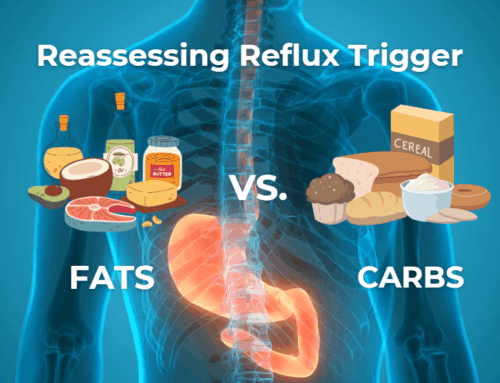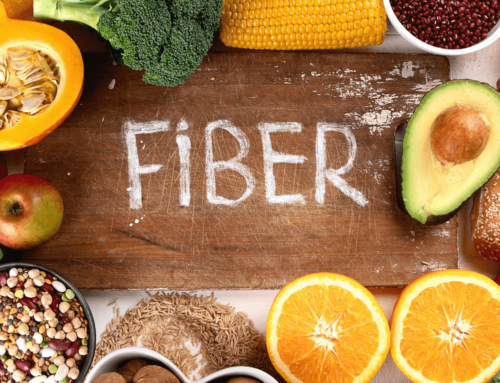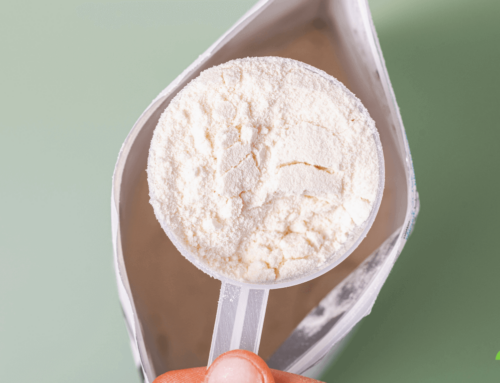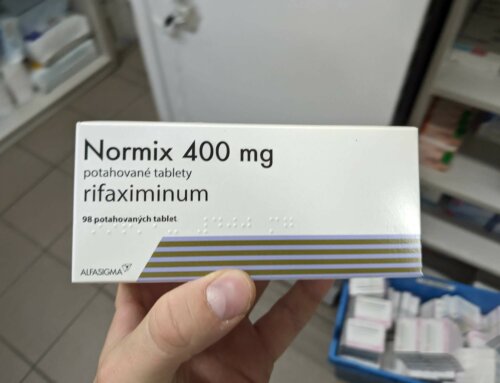I recommend that people with digestive health issues reduce, NOT increase, hard to digest fermentable carbohydrates to control symptoms of IBS, acid reflux and other digestive health issues related to general imbalance of gut microbes (dysbiosis) and small intestinal bacterial overgrowth (SIBO).
This approach is outlined in my two books, Fast Tract Digestion IBS and Fast Tract Digestion Heartburn. People who implement my recommendations typically consume low to moderate levels of overall carbohydrates (under 100 grams / day) though the Fast Tract Diet is flexible for those who can tolerate higher overall carb levels – such as athletes or people who are able to process more carbs without metabolic complications and consequences. Another approach I write about in Heartburn Cured is a low carb diet. The premise is similar but less specific in that overall carbs, including fermentable carbs, are limited.
I was puzzled by a recent blog article by Jeff Leach called “Sorry low carbers, your microbiome is just not that into you”.
I have a lot of respect for Jeff’s efforts to generate some data correlating changes in gut microbe populations with diet as well as his expertise in paleolithic diets. And we both seem to agree on a most important premise: Health improvements can be made by altering our gut microbiome through dietary means.
My concern centers on the main point of this particular article: people need to consume more fermentable carbohydrates such as resistant starch, fiber and oligosaccharides or they will suffer a variety of health consequences. Increasing the amount of dietary fermentable carbs shouldn’t be a problem (and may even have some health benefits) for people who do not suffer from digestive issues. However, it’s the worst advice possible for people who do. The idea that people on low carb diets are at risk for these negative health consequences is one that we need to look at very closely and any conclusions or recommendations for dietary modification should be backed by scientific evidence.
Since I am unaware of any negative health outcomes linked to reducing fermentable carbs in the diet, I wanted to understand the evidence for Jeff’s claims.
According to his article, consuming too few dietary fermentable carbs reduces fermentation by gut microbes and results in a shift to a less acidic environment in the large intestine. Jeff suggests that this pH shift favors the growth of less healthy, gram-negative endotoxin-producing gut bacteria such as Bacteroides, Enterobacter, and other pathogens, but reduces the growth of butyrate-producing (gram positive, endotoxin-negative) bacteria that presumably are “more healthy” for our gut. Further, these changes can create a “classic case of microbial dysbiosis”. In this scenario, the gut microbiome of low carb dieters can lead to inflammation and leaky gut from microbially produced endotoxin (lipopolysaccharide, LPS), metabolic disease, obesity and heart disease. If these claims were true, reducing carbs might be dangerous!
When I examined these claims, I found they were not supported by the data presented or referenced in the article. The scatter plot presented showing the (lack of) correlation between fat consumption and BMI from a 7 day self-reported data set has nothing to do with gut microbes or consumption of fermentable carbs. If anything, the data simply supports that fat doesn’t make you fat. Jeff included several references to published journal articles to support his view on how critical it is to feed gut microbes to prevent these problems. I took a look at these articles to see what the evidence was:
Citation 1.
This is a report of lab studies looking at the growth of some gut microbes in culture (growing poop in the laboratory) adding one type of fiber and some sugar alcohols.[1] I am afraid I don’t see the relevance to health outcomes in people. One the other hand we know that fiber and sugar alcohols can cause huge digestive problems for many people.[2],[3] Also, refer to my article, The Dark Side of Fiber.
Citation 2.
This paper reports that fiber increases some types of gut bacteria but did not link the results to any actual health outcome.[4] The authors discuss the hope that fiber protects against chronic diseases such as colon cancer but the only study I am aware of that showed any protective effect of fiber for colon cancer is the EPIC study conducted in Europe.[5] One the other hand, several other studies and a pooled analysis of 13 prospective cohort studies have concluded that fiber does not protect against colon cancer.[6],[7],[8],[9]
Citation 3.
This paper reviewed gut microbes in the context of energy harvest, but again made no connection with health outcomes.[10] The authors discuss the connection between bacterial lipopolysaccharide (endotoxin), a toxin associated with the cell wall of certain types of gram-negative bacteria and chronic inflammation (see Jarisch-Herxheimer reaction). However, fermentable carbs may actually increase the overall load of endotoxin-positive bacteria. The reason is that a significant number of gut bacteria (Bifidobacteria represent one of over 1000 species) are gram negative endotoxin-positive species which also feed on fermentable carbs. These organisms would be reduced on a carb limited diet.
Recent studies don’t support the idea that fermentable dietary fibers specifically promote the growth of gram positive (entoxin-negative) bacteria over gram negative (endotoxin-positive) bacteria. The De Filippo study[11] showed that children from Burkina Faso in Africa who consume a high fiber diet, harbored higher relative amounts of Prevotella (gram-negative, endotoxin-positive) bacteria while age-matched Italian children whose diet includes less fiber, harbored more Fimicutes (gram-positive endotoxin-negative type of bacterial types). So following the logic above suggesting that endotoxin causes inflammation and leaky gut, children in Burkina Faso who eat more fiber would be expected to have a higher risk for endotoxin-related health problems.
Another study led by microbiologist Frederic D. Bushman[12] linked diets high in protein and animal fat with a predominant gut population of Bacteroides (gram-negative endotoxin-positive) type bacteria and diets higher in carbohydrates with a predominant gut population of Prevotella (also gram-negative endotoxin-positive) type bacteria. The point here is that both types of diet resulted in a predominance of bacteria that make endotoxin – suggested by the Leach article as “leading to inflammation and leaky, metabolic disease, obesity and heart disease.”
Jeff Gordon’s team[13] found that obese individuals possessed more Firmicutes (gram positive, endotoxin-negative) type bacteria and less Bacteriodetes (gram negative, endotoxin-positive) type bacteria, while lean individuals had less Firmicutes and more Bacteroidetes. Does this mean lean people are more at risk for endoxin-mediated inflammatory disease?
In reality, it doesn’t really matter. There is no report I am aware documenting the Herxheimer reaction from diet-mediated changes in gut microbe populations. Bacteroidetes, Prevotella and Firmicutes type bacteria are normal inhabitants of our digestive tract. Bacterial species belonging to each of these groups have unique metabolic capabilities that cause their relative numbers to rise or fall based on the types of nutrients available to them.
Citation 4.
This was a study in mice showing some fiber species caused less weight gain than fat[14] This result is not surprising since fat has more calories and doesn’t need microbes in the mix for breakdown and energy recovery. But what does mean in terms of low carb diets and the microbiome?
Citation 5.
This report talks about changes in energy harvest when calorie loads are altered in obese vs. lean people.[15] No surprise that as calories are increased you get more bacteria and more energy harvest. That is the main purpose of having a microbiome.
Citation 6.
This paper talks about an in-vitro study (culturing gut bacteria in the lab) which showed that resistant starch induced a shift in the bacterial populations and more butyrate production[16] concluding resistant starch may promote bowel health. There is no direct evidence in humans I am aware of, that more butyrate (relative to basal levels generated on a low carb diet with plenty of green leafy vegetables) improves bowel health (I am open to it if it exists). On the other hand, a study by Alberto Martain’s group highlighted in this article suggests that too much butyrate from too many dietary carbs may actually increase the risk of colon cancer.
Citation 7.
This paper suggests that prebiotics (indigestible oligosaccharides) should be added to a diet of fruits and vegetables.[17] The paper states “Prebiotics specifically stimulate the growth of endogenous microbial population groups such as bifidobacteria and lactobacilli which are perceived as being beneficial to human health”. But given that we harbor over 1000 different species of bacteria all working together, what is the actual evidence that increasing only these two organisms will optimize human health?
Citation 8.
This paper promotes probiotics (such as bifidobacteria and lactobacilli) and prebiotics as “functional foods that fortify the lactate producing microflora of the human gut”.[18] Where are the studies showing that current probiotics (save limited improvement in some studies of diarrhea) and prebiotics (more relevant to this discussion) are linked to positive health outcomes?
Citation 9.
This review article suggests that diet appears to play a role in shaping the microbiota and promoting obesity-associated dysbiosis but that more work is needed to figure out the role of prebiotics and probiotics to promote healthy gut flora.[19] Where is the data?
Clearly, our bodies have evolved an amazing partnership with over 100 trillion microorganisms to recover vitamins and nutrients from mostly vegetative (and some animal) matter that we can’t digest. We receive an estimated 30% boost in energy thanks to our gut microbes, a benefit that has served us well allowing us to survive in times of limited food. But in modern times, with access to all types of foods 24/7, what is the healthiest diet that will optimize our gut microbiome and best protect us from disease? I don’t pretend to know the answer to this question, but one thing is for sure. The answer will be different for different people.
The real question is “how do shifts in the microbiome impact health?”
We are just beginning to understand the effects of diet, lifestyle and illness, as well as medicines used to treat infections, on the gut microbiome. So far, we know that humans have certain enterotypes (the major groupings of gut bacteria) that often don’t change much in response to short term dietary alterations. On the other hand the relative abundance of individual bacterial species is responsive to changes in diet in a manner that often differs for individuals. It may be tempting to speculate about what these shifts mean, but before recommending sweeping dietary changes (i.e., people on low carb diets have unhealthy microbiomes and need to alter their diet, add prebiotics, fiber, etc.), we should generate the studies to provide the evidence – in terms of health outcomes, particularly for people suffering with GERD, IBS and other SIBO and dysbiosis-mediated conditions.
Controlled studies of different diets and populations including people with digestive health issues, will certainly help. Given the variety of foods our body can use for growth and energy, it’s not a simple task to determine which type of diet is healthiest. My gut says a varied diet containing animal protein and fat along with plenty of less starchy vegetables, seeds and nuts with some seasonal fruits will likely win in the end, but I’m just speculating.
Also see my articles “Resistant Starch – Friend of Foe” and “The Dark Side of Fiber”.
[1] Beards E, Tuohy K, Gibson G. Bacterial, SCFA and gas profiles of a range of food ingredients following in vitro fermentation by human colonic microbiota. Anaerobe. 2010 Aug;16(4):420-5.
[2] Dear KL, Elia M, Hunter JO. Do interventions which reduce colonic bacterial fermentation improve symptoms of irritable bowel syndrome? Dig Dis Sci. 2005 Apr;50(4):758-66.
[3] Hyams JS. Sorbitol intolerance: an unappreciated cause of functional gastrointestinal complaints. Gastroenterology. 1983 Jan;84(1):30-3.
[4] Shen Q, Zhao L, Tuohy KM. High-level dietary fibre up-regulates colonic fermentation and relative abundance of saccharolytic bacteria within the human faecal microbiota in vitro. Eur J Nutr. 2012 Sep;51(6):693-705.
[5] Bingham SA, Day NE, Luben R, Ferrari P, et.al. Dietary fibre in food and protection against colorectal cancer in the European Prospective Investigation into Cancer and Nutrition (EPIC): an observational study. Lancet. 2003 May 3;361(9368):1496-501
[6] Fuchs CS, Giovannucci EL, Colditz GA, Hunter DJ, Stampfer MJ, Rosner B, Speizer FE, Willett WC. Dietary fiber and the risk of colorectal cancer and adenoma in women. N Engl J Med. 1999 Jan 21;340(3):169-76.
[7] Park Y, Hunter DJ, Spiegelman D, Bergkvist L, et.al. Dietary fiber intake and risk of colorectal cancer: a pooled analysis of prospective cohort studies. AMA. 2005 Dec 14;294(22):2849-57.
[8] Uchida K, Kono S, Yin G, Toyomura K, et.al. Dietary fiber, source foods and colorectal cancer risk: the Fukuoka Colorectal Cancer Study. Scand J Gastroenterol. 2010 Oct;45(10):1223-31.
[9] Giovannucci E, Rimm EB, Stampfer MJ, Colditz GA, Ascherio A, Willett WC. Intake of fat, meat, and fiber in relation to risk of colon cancer in men. Cancer Res. 1994 May 1;54(9):2390-7.
[10] Krajmalnik-Brown R, Ilhan ZE, Kang DW, DiBaise JK. Effects of gut microbes on nutrient absorption and energy regulation. Nutr Clin Pract. 2012 Apr;27(2):201-14.
[11] De Filippo C, Cavalieri D, Di Paola M, Ramazzotti M, Poullet JB, Massart S, et al. Impact of diet in shaping gut microbiota revealed by a comparative study in children from Europe and rural Africa. Proc Natl Acad Sci U S A. 2010;107:14691–6.
[12] Wu GD, Chen J, Hoffmann C, Bittinger K, et.al. Linking long-term dietary patterns with gut microbial enterotypes. Science. 2011 Oct 7;334(6052):105-8.
[13] Ley RE, Turnbaugh PJ, Klein S, Gordon JI.Microbial ecology: human gut microbes associated with obesity. Nature. 2006 Dec 21;444(7122):1022-3.
[14] Arora T, Loo RL, Anastasovska J, Gibson GR, et.al. Differential effects of two fermentable carbohydrates on central appetite regulation and body composition. PLoS One. 2012;7(8):e43263.
[15] Reiner Jumpertz, Duc Son Le, Peter J Turnbaugh, Cathy Trinidad, et.al. Energy-balance studies reveal associations between gut microbes, caloric load, and nutrient absorption in humans. Am J Clin Nutr 2011;94:58–65.
[16] Lesmes U, Beards EJ, Gibson GR, Tuohy KM, Shimoni E. Effects of resistant starch type III polymorphs on human colon microbiota and short chain fatty acids in human gut models. J Agric Food Chem. 2008 Jul 9;56(13):5415-21.
[17] Blaut M. Relationship of prebiotics and food to intestinal microflora. Eur J Nutr. 2002 Nov;41 Suppl 1:I11-6
[18] Saulnier DM, Kolida S, Gibson GR. Microbiology of the human intestinal tract and approaches for its dietary modulation. Curr Pharm Des. 2009;15(13):1403-14.
[19] Shen J, Obin MS, Zhao L. The gut microbiota, obesity and insulin resistance. Mol Aspects Med. 2013 Feb;34(1):39-58.







Hey Norm thank you for bringing clarity and pointing out “What we really know and what we really don’t”.
True enough Danny. There is so much we don’t know, but what an exciting time of discovery we live in.
Another great article! I guess a few things that we know for sure are:
– A sterile gut is unhealthy
– Microbes in the wrong places (SIBO) are unhealthy
– The Standard American diet of processed sugar, processed grain, and vegetable oils, does not provide a good environment for healthy gut microbe populations
Thanks for tackling this subject!
Tim
Thanks for reading Tim,
I have my own perspective on the short comings of SAD diet for people with gut issues: Oils – depends which ones and how they were produced, grains – those with high resistant starch levels are the worst, sugar – fructose and lactose are the bad boys, sugar alcohols – nuff said, and don’t forget the many types of fiber – the wort types from legumes.
Norm – a little birdy told me you were looking for info on what cavemen ate. I stumbled across this today and thought you might enjoy it: https://academia.edu/1940344/From_Poi_to_Fufu_the_fermentation_of_taro
Thanks Tim. How did you know? Maybe resistant starch is linked to psychic abilities.
Did you look at Micronesia? They carefully managed their ‘canoe plants’: breadfruit (Artocarpus spp.), bananas and plantains (Musa spp.), aroids or taros (Alocasia, Colocasia and Cyrtosperma), and yams (Dioscorea spp.). Lots of pounded/fermented starchy ‘puddings/pastes’ in that area. Their foodways didn’t change much until around the 1900s. There’s research & evidence suggesting that they were very healthy (healthier) prior to the c. 1970s. Aroids are research neglected, but there’s no doubt in my mind that they were very important in proto-farming systems. There’s research, and the bulk of the articles always mentions that aroids are/were used as weaning foods in Africa. Recently I learned that this habit is also common in Asia (China) the articles always refer to the starch granules. Another habit that I found interesting is the practice to eat boiled taro (Colocasia) tubers as breakfast food (East Africa mostly), there might be a relation with its digestibility. & coming to think of it: how come so many cultures eat hot breakfast food? What’s also interesting: we tend to think that Asians ‘only’ eat rice and noodles whereas in reality numerous people (still) do eat indigenous roots and tubers, mostly not every day but (prob.) more often than generally is assumed.
Interesting perspective Karin. There is no doubt that roots and tubers are represented in the human diet. I just returned from Northern Japan (Yamagata) earlier this month. I kept asking people what the large leaved crop plant was I observed near many of the rice paddies. I never got an answer, but they looked like taro plants.
I just found this link for a festival that took place shortly before my arrival where they used excavators to prepare a pretty big stew using taro. https://www.whatsonxiamen.com/wine_msg.php?titleid=2663
As the picture indicates, taro is consumed in Japan, but my experience has been that the main form of starch by far in Japan is glutinous sticky rice.
But you bring up a good point. In places where diets contain lots of fiber and resistant starch are people healthier and do their guts adjust to minimize the types of functional gut disorders observed frequently in the West? I wish I knew the answer to that question.
Would indeed be interesting to know why people with digestive track issues can’t tolerate fibers that well, even raw vegetables. And it would even be more interesting to know how those with issues will be able to tolerate fibers again instead of avoiding.
Cavemen really seemed to eat lots of fibers which were converted into all kinds of substances like SCFA. I once heard that those SCFA could account for more than 30% of the totall calories.
We might have evolved on it:
https://wholehealthsource.blogspot.nl/2009/12/butyric-acid-ancient-controller-of.html
Good comments Joopie. The “why” is what I write about in the Fast Tract Digestion series. In addition to carbohydrate malabsorption (usually the problem is just too many – for today’s gut?), but there are several other factors that can make us more susceptible to SIBO/dysbiosis that may need to be addressed.
Your second point is also of great interest and feeds into the great ongoing debate. How can some seem to so healthy on plant-based diets and others on meat based? One thing people don’t think much about is that 10-30 percent of proteins are also malabsorbed and fermented – more apt to happen in large intestine- by gut bacteria. And this also gives rise to SCFAs including butyrate. Some food for thought.
The short answer is “it is what it is” People with IBS, GERD and one of many other conditions linked to SIBO can’t tolerate as much fermentable carbs. Luckily most vegetables don’t actually have that many (compared to starches and legumes). And many starches are of the easy to digest kind. Back in caveman days, people were likely more adapted to their local diet. People living in areas where more plant, including fiberous plants, were consumed, may have been better adapted in terms of their gut microbiome. These days people are able to eat anything and everything in absurd amounts 24/7. I am not surprised by the number of gut issues that arise. Add to that the pervasive used of food preservatives and over prescribing of antibiotics and you have perfect storm of sorts.
After reaching a baseline of no symptoms on the Fast Tract plan, I recommend people experiments with adding the foods they prefer and seeing what the effect is.
Sadly your books are only sold by amazon and in kindle edition. I indeed think we need to look at the gut and his residents and if needed influence them with the right foods (for everyone different).
Nobody really knows what those creatues are capable of and how they interact with us, but lately we really seem to lose connection with them.
Although you’re a microbiologist and probably already following all the news. I’ll post some interesting things that made me think even more.
An interesting video:
https://www.youtube.com/watch?v=GAF-AblJpfM
Lateral gene transfer bacteria-human (especially found in cancer cells).
https://www.ploscompbiol.org/article/info%3Adoi%2F10.1371%2Fjournal.pcbi.1003107
If those are capable of changing our genetic information, how might they influence us in a epigenetic way?
Bacteria needed for life.
https://www.sciencenews.org/view/generic/id/351368/description/Gut_microbes_may_put_barrier_between_species
But what are the ones most benefecial for human?
Norm,
There is so much information out there that sounds “official”, only come to find out that it’s way off base. Thanks for clarification in this article. I really don’t understand a lot of the technical language. All I know is that about 7-8 months ago I read Fast Track Digestion Heartburn and dedicated myself to your plan. After years of indigestion, stomach troubles, and probably hundreds of pills, your plan totally solved my problems. I rarely take acid reducers. Over time my system has strengthened to the point that even if I have an occasional meal that is off plan, I just don’t get sick. Thanks, and thanks for your on-going work!
Thanks Doug, I appreciate your comment. The next article definitely needs to be less technical.
Norm,
I’d still like to purchase your ebook(s) (pdf if possible- not kindle version). Will this soon be able trough your site?
And what exactly is the difference between fast track heartburn and IBS. Those both cover about the same information?
An aquaintance has seen a great deal of improvement from the FODMAP diet. Less discomfort, better glucose control. Is it possible to slowly, very slowly, introduce small amounts of the fructan (and related fibers) so that a bit of tolerance can be re-gained. She doesn’t want to eat a scone, but would like to be able to survive a small amount of onion or garlic in a restaurant meal.
The FODMAP approach is based on some excellent research and has helped many people. One main difference between FODMAP and the Fast Tract Diet is that the Fast Tract Diet is a quantitative approach. Even foods with small amounts of fructans and other fibers are allowed within the limits of daily fermentation potential (FP). As for tolerance, I do think that after getting your gut microbes under control, you will gradually increase your tolerance of all difficult-to-digest carbs provided you have addressed any other underlying conditions that can promote SIBO.
Thank you for taking the time to reply. She is very glad to hear it!
Thank you for taking the time to reply. She is very glad to hear it!
not all endotoxin is the same. in fact, some forms of ‘endotoxin’ inhibit the effects of other endotoxin… https://www.ncbi.nlm.nih.gov/pubmed/17217428
this knowledge may alter your discussion since some of the gram-negative ‘bugs’ that you discuss may actually have inhibiting effects on other gram-negative ‘bugs’. In addition, gram-positive bacteria are not safe just because they are endotoxin free…there are MANY pathogens that are gram-positive and therefore, this endotoxin-free bacteria could have many other effects could contribute to inflammation.
Thanks Camillez,
Great reference. I had not heard of competitive endotoxin binding before. Fascinating stuff. I also agree that many pathogens are gram-positive and have made that point often though can’t recall off hand if I touched on it here. In fact, I wrote my doctoral thesis on Bacillus anthracis, one extremely pathogenic gram positive bacterium that is capable of eliciting inflammation through it’s cell wall component, peptidoglycan.
I have a question re: food allergy testing. I’ve had the testing and the results are I’m allergic to dairy, eggs and nuts. I am now avoiding these food for three weeks. Do you think I really have allergies to these foods with SIBO, heartburn, and GERD?
Hi Debbie, I can’t comment about people’s individual diagnoses, but you may consider a couple of questions: Do you notice any difference in how you feel? If so, perhaps the results were meaningful. The published findings I am aware of don’t show a good correlation between antibody testing results and IBS symptoms. You might also wish to consider the antibody type (IgG vs IgA) and titer. IgG responses are more indicative of systemic exposure and higher titers are indicate a more robust antibody response.
My IBS suffering has been improved with a ketogenic diet and I feel so much better. I had been a vegetarian before and tried many diets including FODMAPS, GAPS, juicing and even eating just avocados for weeks but to no avail. For me ketogenic eating is working and I do wonder about the long-term effects, but it is much better than my gut swollen 24/7, so I am scared to relax this diet until I give a year or more. Thanks for your research. I think us guys are more stoic on this topic and don’t reach out as much as the ladies so IBS is probably underreported.
Hi William, If it works for you, I see no reason to worry about eating this way. There is some hype about ketogenic diets being unhealthy. I don’t buy into that. If anything, keto diets are the healthy choice in my view for people who don’t tolerate many carbs. There are many LC veggies you can include on a keto diet. I do think it’s a good idea to eat a variety of both animal and plant based foods to promote microbiome diversity. But when it comes to plants, just stick to the LC choices.
As was written: “The reason is that a significant number of gut bacteria (Bifidobacteria represent one of over 1000 species) are gram negative endotoxin-positive species…”.
I’m not sure if this was the knowledge three years ago, but I cannot find a single reference that states that Bifidobacteria are gram-negative. The phylum under which Bifidobacteria are classified is Actinobacteria, which is gram-positive. What am I missing?
Hi Karel,
I didn’t go back and check the reference, but I believe that article mentioned Bifidobacteria. My point was that given the large number of gram negative bacteria in the gut (not Bifidobacteria as you correctly state) that produce endotoxin, lower carb diets should limit this reaction not increase it by reducing the number of bacteria producing endotoxin.
After being on a Keto(ish) diet for a few months I became worried about this topic when I read The Microbiome Diet. The prescription for a healthy gut microbiome in that book is very different from Keto because there is way more emphasis on vegetables that, while not high-carb or starchy, would definitely put anyone way above the 20g of carbs limit. You just can’t eat all the onions, leeks, etc. that are prescribed by that diet and stay in ketosis. But my personal experience and anecdotal evidence from other low-carb dieters tells me that LCHF is good for the gut. This is probably because the harm in the gut caused by starches, refined carbs, sugar, and other non-keto things outweighs the benefit of eating all of the things you would need to eat to feed your good gut bacteria. But I still wonder if I wouldn’t benefit from increasing carbs from 20-30 grams a day to 40-50 grams in order to fit in more of the vegetables that help the microbiome.